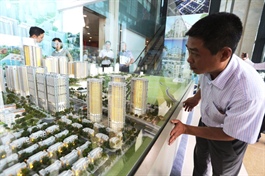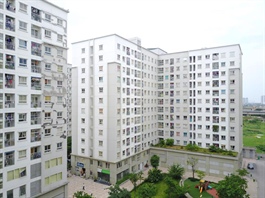Varying factors to determine the fate of real estate
Varying factors to determine the fate of real estate
Experts are increasingly hopeful that the real estate market in 2023 and beyond has a good chance of recovery, with liquidity volume returning gradually and supply expanded in the market.

According to chairman of the Vietnam Real Estate Brokers Association Nguyen Van Dinh, Vietnam’s real estate market is not repeating the crisis cycle which occurred in 2012.
“Currently, urban development is high and infrastructure investment is taking place strongly, along with the rocketing increase demand for housing. So the demand for investment in real estate is rather high. These are the factors that create a great motivation for the market’s ability to recover,” Dinh told VIR.
Banking and finance expert Can Van Luc added that the market will be revived by the end of the year.
“When banks have new credit room, real estate will see more transactions from homebuyers. Real demand is expected to be a bright spot during the year,” Luc said at a forum on forecasting the real estate market organised by the Vietnam Real Estate Association in Hanoi on January 3.
Do Thu Hang, senior director of Advisory Services for Savills based in Hanoi, said that the market can develop again if the problem of liquidity is thoroughly resolved.
“There are two basic ways to do this. Firstly, the supply of projects in the market, especially low-cost and affordable housing projects, needs to be ensured. Secondly, real estate prices need to be adjusted to an appropriate level, especially products after a period of strong growth, to help stimulate investment demand,” Hang said, adding, “Liquidity will still be there, and cash flow and projects in general will remain weak if there are no real estate products with suitable prices and legalities are not ironed out.”
Aiding supply and reducing selling prices will not be simple, according to Hang. Shortages and a supply-demand imbalance have been an ongoing situation since 2018 due to legal issues. Over the past couple of months, the government has moved to encourage accelerating of legal solutions and loosening credit.
“But in order to solve these problems, a certain period of time is needed. Developers are facing many difficulties in the market in terms of corporate bonds and bank credit, making project development more difficult,” Hang said.
Meanwhile, input costs such as the raw materials, labour, and interest rates on loans for project development are increasing, along with the time waiting for legal procedures to pull the price up.
Also speaking at the January 3 forum in Hanoi, Assoc. Prof. Dr. Tran Kim Chung, former deputy director of the Central Institute for Economic Management, said that cash flow into real estate will be more positive compared to last year.
“This is thanks to the decision to extend the credit limit from 1.5-2 per cent for commercial banks in late 2022 and this will continue to loosen in 2023,” Chung said. “Uptrending securities will also provide a huge amount of money going into the economy and the real estate market.”
Bonds are also gradually recovering. In 2023, there are still numerous bonds to mature, but if policies are timely the problem will be under control, according to Chung. In other areas of cash flow, remittances in Vietnam are still stable, and there is still positive sentiment from many potential investors with the mentality that there is nothing better to invest in than land and houses.
According to a report released late 2022 by the Finance Economics Real Estate Institute of Dat Xanh Services, office real estate was one of the segments that recorded a good recovery last year. Supply increased slightly, and rents and absorption rates have improved similar to pre-pandemic levels.
This year, the segment will likely be affected as businesses reduce their size and costs, rent smaller offices, or switch to the trend of choosing coworking spaces with more optimal costs, the institute said.
With retail real estate, more foreign retailers enter the market, causing rents to increase. In this period, the absorption rate was higher in the non-central business districts and shopping centres are restructuring their portfolios after the pandemic.
It is forecasted that 2023 will still be a prosperous year for the retail segment, with the expansion trend of foreign retail investors into Vietnam projected to remain strong.
Industrial real estate was also a bright spot in the past year with a continuously increasing rent and occupancy rate. Seeing high rents due to limited supply, occupancy rates increased slightly on-year, at an average estimated at over 80 per cent.
This segment continues to be evaluated positively in the year after forecasting no decrease in rents, recognising the trend of investment in warehouses and ready-built factories, logistics, and data centres.
Elsewhere, residential real estate is heavily influenced by fluctuations of the market and has not been able to recover as quickly as expected in the past year.
The scarce supply caused the selling price to increase slightly, plus the policy of tightening real estate credit caused the absorption rate to drop sharply from the third quarter of 2022, and to fall even more deeply in the fourth quarter.
It is forecasted that housing supply will not improve much in 2023 due to unresolved legal problems, and prices are at high levels. However, absorption rates are expected to have more positive changes towards the end of the year when solutions to remove market bottlenecks from the government and real estate businesses begin to take effect.
Nguyen Thi Thu Huyen, chairwoman of NewstarLand, agreed with the report’s estimations. “In addition, the 2023 market will have a strong purification. Only projects that meet real needs and have full legality will be offered for sale and attract a new customer community. This is essentially helping the market develop more sustainably,” Huyen told VIR.






















